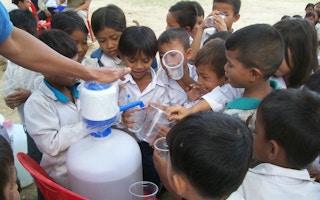When Francois Jaquenoud knocked on Danone’s door seven years ago seeking clean-water funds for Cambodians, the maker of Evian turned him down. Two years later, Danone reversed course.
Just how did the Paris-based company that’s the biggest yogurt maker get involved half a world away in Cambodia?
Credit dates to when the founder of “1001 Fontaines pour demain,” French for “1,001 Fountains for tomorrow,” crafted a business plan to provide 2 liters (a half-gallon) of safe water a day to each Cambodian. From not a drop in 2004, the former Accenture Plc (ACN) consultant’s enterprise now sells water to 100,000 Cambodians at cost: less than a euro cent (1.38 U.S. cents) a liter.
With the model replicated in Madagascar in 2008 and this year in India, Danone’s connections bring Jaquenoud financial resources and more. “They taught us how to sell water,” the 59-year-old said last month at the Convergences World Forum of public and private groups working to curb poverty.
Danone isn’t alone trying to aid a world where more than half live on less than $2 a day, 2.5 billion of the 7 billion residents lack adequate sanitation, a quarter of humanity has no electricity, 1.1 billion live without access to safe water.
Slowly, that’s changing. Coca-Cola Co. teamed with Deka Research & Development Corp. to roll out a water-purification system in August as part of the Ekocenter kiosk pilot project in South Africa to make dirty waters safe to drink.
Star power
The 20-foot kiosk provides community access to wireless communication, electricity and vaccine storage in a technology invented by Deka that can deliver 800 liters of clean water daily at a lower hourly power cost than a hair dryer, Coke says.
As pilot work on the water-purification units in Mexico and Paraguay followed, actor Matt Damon, co-founder of Water.org, stumped for clean water, traveling to Bangalore and elsewhere in India in August to meet with microfinance groups on loans to locals for hand pumps, wells and toilets.
Unsafe water from rivers and ponds kills 1.6 million children aged four and younger each year, 1001 Fontaines says. Cambodia figures in that: just 30 percent of its rural population has access to safe drinking water, United Nations data shows.
Danone partnership
Danone.communities supports projects that seek lasting impacts on nutrition and water, its managing director said.
1001 Fontaines “was our second project and we were attracted by its ambitious model as well as the quality of its entrepreneurs,” Emmanuel Marchant said.
Danone.communities grew out a partnership six years ago with the French bank Credit Agricole SA (ACA) after Danone Chief Executive Officer Franck Riboud met Nobel Peace Prize-winnerMuhammad Yunus. It backs nutrition projects in Bangladesh, Senegal and China, water works in Cambodia, India and Mexico.
Jaquenoud’s connection to the water story stems from meeting Chay Lo, an engineering student from Cambodia finishing studies in France, at a Paris dinner. Chay explained how water is an issue in Cambodia as too many drink from ponds, exposing themselves to bacterial diarrhea and malaria.
Jaquenoud visited Bernard Giraud, then-head of sustainability at Danone, in 2006 to discuss financing technology that filters river and pond water through ultraviolet rays.
A local entrepreneur was to manage the filtering unit, selling safe water to the community. Giraud said no.
Then in 2007 Danone.communities began, and a partnership with 1001 Fontaines followed the next year. Danone.communities has spent 73 million euros on eight projects in 2013 compared with 20 million euros when it started. Danone.communities declined to say how much it spends on 1001 Fontaines.
Bottled-water sales
Danone, whose water division is second-largest by volume after Nestle SA, on Oct. 16 said third-quarter bottled-water sales rose 17 percent on a like-for-like basis to 1.09 billion euros from a year earlier, driven by demand in emerging markets.
Jacquenoud doesn’t see his venture as vying with Danone over water: “We will never take market share away from them and they will never create a market from our beneficiaries.”
The business produces water for a quarter of what Danone does and targets those “at the very bottom of the pyramid,” he said. Danone’s lowest price is 4 euro cents a liter.
With 14.9 million people in Cambodia, 1001 Fontaines serves 100,000 paying customers and provides free water to 58,000 schoolchildren, a third of them younger than 10.
Jacquenoud hopes to triple the 80 production sites in Cambodia by 2016 to serve 10 percent of the rural populace.
Water at “less than 1 euro cent a liter is not very expensive” — cheaper than wood to boil pond water or medicine, he said.










